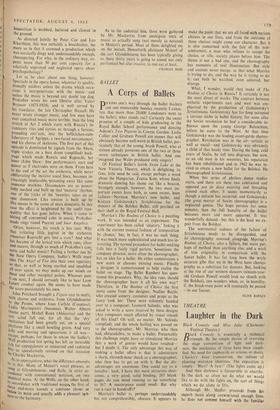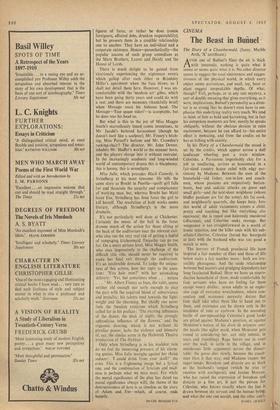THEATRE
Laughter in the Dark
black Comedy is essentially a technical D triumph. By the simple device of reversing the stage conventions of light and dark- ness, the mechanics of farce have been simpli- fied. No need for cupboards or screens or doors, Charley's Aunt transvestism, the tedium of planting mistaken identities. The exposition is simply: 'Blast! A fuse!' (The lights come up.) And then darkness- is favourable to anarchy. In the dark so often we do what we would like to do with the lights on, the sort of things which we do alone in lifts.
Although Mr. Shaffer proceeds from his superb thesis along conventional enough lines, he does not content himself with the familiar
figures of farce, or rather he does (comic foreigners, affected debs, drunken respectability), but he presents them in a credible relationship one to another. They have an individual and a corporate existence. Hence—parenthetically—the popular success of such group comedians as the Marx Brothers, Laurel and Hardy and the House of Lords.
There is much delight to be gained from vicariously experiencing the nightmare events which gallop after each other in Brindsley Miller's apartment when the fuse blows, so I shall not detail them here. However, I was un- comfortable with the 'modern art' gibes, which have been going thirty years and could do with a rest, and there are moments (thankfully brief) when Message rears his hideous head. The Message--'Esse quam videri'—is acceptable, but he does rear his head so.
But what is this to the joy of Miss Maggie Smith's marvellously timed, comic inventions, to Mr. Jacobi's battered harassment (though he doesn't look like a sculptor), Mr. Finney's bitch- ing, Miss Purnell's bottom and Mr. Crowden's rocking-chair? The director, Mr. John Dexter, inhabits Mr. Shaffer's world to the manner born, and the players charge into it without restraint. In the increasingly academic and long-winded world of contemporary drama this is blasphemy, this is heresy, this is serendipity.
Miss Julie, which precedes Black Comedy, is Strindberg at his most tiresome. He tells the same story as Brecht in Puntila—spoilt girl falls for and threatens the security and complacency of working man, but, whereas Brecht has Matti leave Eva, Strindberg has Jean force the girl to kill herself. The resolution of both works seems literary, although Strindberg's is the more dramatic.
It's not particularly well done at Chichester. Certainly the music of the ball in the foyer drowns much of the action for those sitting at the back of the auditorium near the relevant exit, who also run the very real risk of getting a lapful of rampaging kitchenmaid. Empathy can go too far. On a more serious level, Miss Maggie Smith, who rises impressively to the challenge of the difficult title role, should never be required to make her final exit through the auditorium. It's an intolerable demand. To judge the unique- ness of this actress, hear her reply to the ques- tion: 'You hate men?' with her astonishing delivery: 'Yes, but sometimes when . . . nature . . . ' Mr. Albert Finney as Jean, the valet, seems neither old enough nor surly enough to play the part with the required blend of subservience and brutality; his talents tend towards the light- weight and the charming. But chiefly one never feels the Swedish eroticism which Strindberg called for in his preface: 'The exciting influences of the dance; the dusk of night; the strongly aphrodisiac influence of the flowers,' and the orgasmic dancing, which is not without its peculiar power, lacks the violence and intensity of, say, the similar scene in the Habimah Theatre production of The Dybbuk.
Only when Strindberg is in his maddest vein do we feel the unnerving pressure of his alarm- ing genius. Miss Julie inveighs against her cheap seducer: 'I could drink from your skull!' she cries. This is a frightening image but a lyrical one, and the combination of lyricism and mad- ness is perhaps what we, miss most. For while the moml significance of the play has dated (as moral significance always will), the theme of the destructiveness of love is as timeless as the story of Adam and Eve—which, of course, ends happily.
DAVID BENEDICTUS































 Previous page
Previous page